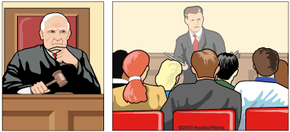Trial Preparation
If you've gone through all of the pre-trial requirements (discovery, motions, negotiations, etc.) and still haven't settled your case, then it's time to accept that you're going to court. In some states, at this point either your attorney or the defendant's attorney (if the defendant has also reached this conclusion) files a memorandum to set trial date (this is also sometimes called a motion to set trial date or an at-issue memorandum). This document can include information like the details of the case, what your demands are, whether you want a jury trial or bench trial (see below), any recent settlement offers you've had, and an estimate of how long you think the trial will last. Note that these types of procedures vary a lot from state to state. In some states there is simply a mandatory status conference at a specified time after the suit is filed in order to set the date for trial.
There are two types of trials -- trials that are heard by a judge (known as a bench trial) and trials that are heard by a jury (known as a jury trial). Deciding which type you need may take some thought. Having a jury trial can slow down the entire process, not only because there is additional time needed for jury selection, but also because your attorney will need additional time (and fees) to prepare. There is also the time the jury must take to decide the case. A judge may (or may not) make a quicker decision. It's not unheard of for judges to delay decisions for months, while a jury might have a decision in a few hours. You never know.
Advertisement
Regardless of the time issue, a jury trial may or may not be what you want. If your case involves any emotional issues, then, depending on which side of those issues you're on, you may or may not want a jury to hear it. If your case will stand only on a legal technicality, then you probably don't want a jury. You could just be seen as greedy and unfeeling. If your case could really go either way, then you stand the chance of a hung jury -- meaning the trial is over but nothing is decided. Rely on your attorney's experience with the courts to determine the best type of trial.
Once you know the type of trial you need, then the trial date can be set. Some courts operate on a "direct calendar" and others on a "master calendar," and some on neither of these systems. If the court your case will heard in is a direct calendar court, then the judge you've been working with will schedule the trial and will also preside over it. If the court is a master calendar court, then you may not have the same judge. Either way, there will probably be a "trial setting conference" where both parties' attorneys meet with the judge to schedule the court date. Jury trials often have to be scheduled at later dates than bench trials because of the time involved in scheduling the jury. If scheduling conflicts later come up for either party, then there can be a request for a continuance.
Before the trial begins, pre-trial conferences are sometimes called to essentially lay out the game plan for the entire trial. (These conferences may not be necessary for all trials.) At these conferences, both attorneys go over what they will present, in what order they will present it, and any issues that will need to be presented separately in order to prevent predisposing the jury about any of the facts. In addition to the meetings, the attorneys sometimes have to submit a pretrial brief that outlines all of the facts of the case with indications of whether the facts are disputed or undisputed. The brief also has to detail their exhibits and evidence and provide a list of witnesses. The judge will also request one of the attorneys to submit a "pretrial order," which is a document that describes what will happen in the trial -- a script of sorts. Just as with the other procedures we've talked about, these vary from state to state and may not be the case in your area. In some areas, a witness list is all that is necessary.
In addition to all of the documents the attorney's have to prepare for the court, they also have to prepare for the trial itself. The attorney has to be intimately familiar with facts and details of the case and present those through the series of questions they ask the witnesses. Here are some of the things the attorney does to prepare for the trial:
- Review all of the depositions and information gathered in discovery
- Prepare questions for witnesses
- Determine the most logical order to tell the story and present the evidence
- Prepare the witnesses for cross examination (questions posed by the opposing attorney)
- Prepare objections for evidence that should not be presented
- Have visual aids and exhibits created
- Write the opening statement
Jury Selection
If your trial will be heard by a jury, then the selection of that jury is very important. Jury pools are pulled from the big list of registered voters in your area. In some courts, the judge will ask the potential jurors all of the questions, but in others the attorneys will also be allowed to ask questions. The jurors are questioned in order to screen out anyone who has personal knowledge of the case, knows someone on either side of the case, or has had a similar experience to the one presented in the case. If allowed, the attorneys may ask additional questions in order to screen out potential jurors who may not support their side of the case. The selected jurors are sworn to decide the case impartially.
